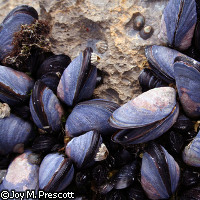Seeding the deep sea
An EU-funded study by researchers in the UK has shed light on the evolution of very small creatures living in the high-pressure depths of the world's oceans. The researchers studied the temperature and pressure tolerance of embryonic blue mussels (Mytilus edulis) to better understand their ability to adapt to changing environmental conditions. The research was funded under the EU's Sixth Framework Programme (FP6) as part of the projects MOMARNET ('Monitoring deep seafloor hydrothermal environments on the Mid-Atlantic Ridge') and MARBEF (Marine biodiversity and ecosystem functioning). The findings were published in the journal Proceedings of the Royal Society B. Pressure, a physical property affecting molecular interactions and in consequence all biological processes on Earth, has a continuous relationship with depth. The authors of the study explain that 'pressure sensitivities of enzymes, structural proteins and membrane-based systems differ markedly between shallow-water and deep-sea species'. According to the study, 'Marine species' habitats are often defined in relation to upper and lower depth limits, and these limits are ultimately related to pressure tolerances of the organisms'. The very early life stages of invertebrates living in the deepest parts of the ocean provide these tiny animals with a window of opportunity to colonise new habitats because their depth tolerance range in each stage of development is different. Temperature is also a major factor in determining where species can live, and tolerance of temperature ranges also varies with the life stages of deep-sea invertebrates. According to the study, this can 'affect the survival and the ability of a species to colonise new habitats'. Temperature affects the rate of metabolism, and therefore larval growth, development and survival. Using high-pressure equipment, the researchers studied the effects of pressure and temperature on the embryonic and larval development of M. edulis. Theirs is the first analysis of this development along the creature's entire physiological temperature and pressure tolerance window. M. edulis, the common blue mussel found on rocky shores, is an invasive and successful species that is rarely found below depths of 40 metres. It is, however, a close relative of hydrothermal vent and hydrocarbon seep (deep sea) mussels, which are believed to have evolved several times (with moments of habitat reversals); evidence shows that in the case of vent mussels, there was a progressive evolution from shallow to deep habitats. The researchers gathered local blue mussels (in Southampton, UK), maintained them in a laboratory microenvironment and induced spawning. The mussels were subjected to a range of temperature and pressure conditions, and the effects noted. The main findings were that pre-spawning temperatures may affect physiological tolerances in the offspring, that decreasing temperature slows down embryonic development; and that successful embryo development was possible from 1 atmospheric pressure (atm) to 500 atm (the maximum tested). 'With the results presented here, it would be possible to estimate that the theoretical maximum distribution depth for the M. edulis embryos is, at least, 2,000 metres for the temperatures tested,' the study reports. It is reasonable, they conclude, to believe that the invasion of the deep sea by M. edulis is possible in terms of pressure tolerances in embryos and larvae. Their findings have implications for marine biodiversity, which is essential for the sustainable development of tourism, fisheries and aquaculture. MOMARNET and MARBEF together have received approximately EUR 11.3 million in EU funding to integrate biodiversity research as part of a larger effort to support the legal obligations of the EU for the Convention for Biological Diversity, the OSPAR and Barcelona conventions as well as several EU directives (Bird Directive, Habitat Directive, Water Framework Directive). The MARBEF centre of excellence focuses on the effects of increased human pressures on marine biodiversity, as this will increase our understanding of how marine ecosystems will adapt to climate change.
Countries
United Kingdom



